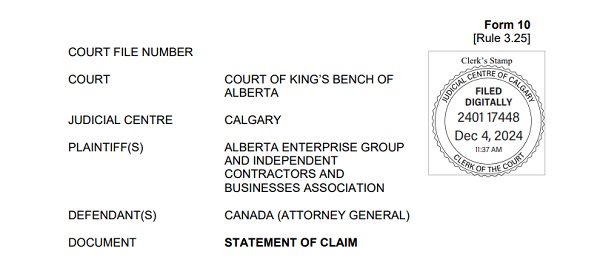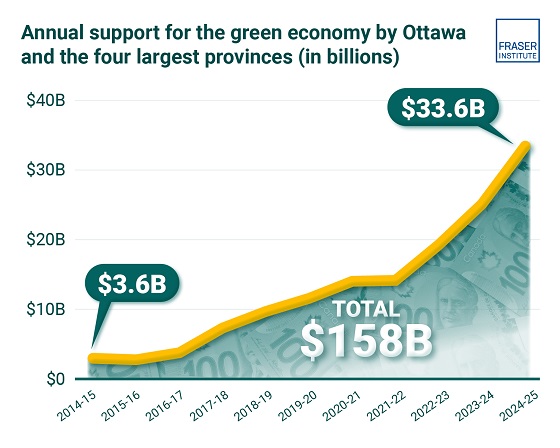Business
Canada’s largest construction association joins with Alberta Enterprise Group in court challenge against Trudeau’st ‘Greenwashing’ law

News release from the ICBA and the AEG
AEG and ICBA Take on Trudeau Government’s Flawed Bill C-59
Earlier this week, the Alberta Enterprise Group (AEG) and the Independent Contractors and Businesses Association (ICBA) jointly filed a constitutional challenge against the federal government, over its new ‘Greenwashing’ law which unreasonably restricts free speech.
The challenge, filed in the Court of King’s Bench of Alberta, targets sections 236 and 239 of Bill C-59, the Fall Economic Statement Implementation Act, 2023, which amended the Competition Act in ways that severely limit the business community’s ability to discuss environmental impacts. These provisions impose unreasonable restrictions on the dissemination of truthful and fair-minded information, striking at the heart of free expression and open debate in Canada.
“This case is about protecting the free flow of information and ideas – the cornerstone of a free and democratic society,” said Chris Gardner, ICBA President and CEO. “This is a direct attack on free expression and an egregious overreach by the Trudeau government – it’s a slippery slope when we start to rely on a government department to police legitimate debate and dialogue on important public policy matters.”
“These regulations pre-emptively ban even truthful, reasonable, and defensible discussion unless businesses can meet a government-imposed standard of what is the truth.” said Catherine Brownlee, AEG President. “Important information for the public to consider is prohibited by the Act if it is not approved by some opaque verification process that the government has not defined.”
ICBA and AEG believe that the amendments violate fundamental Charter rights and undermine Canada’s ability to foster economic growth and responsible resource development. The two associations are committed to fighting for the principles of free expression and informed public discourse, which are essential to a vibrant economy and a healthy democracy. This legal challenge underscores AEG and ICBA’s dedication to supporting the businesses and workers whose skill and innovation drive a large part of Canada’s prosperity.
One of the most troubling aspects of the law is its one-sided application. “While businesses are gagged, critics of resource development remain free to make negative or unverified claims without facing similar scrutiny,” said Mike Martens, President of ICBA Alberta. “This creates a lopsided marketplace of ideas, where one essential participant – the business community – is effectively silenced.”
A copy of the filing can be found HERE.
About AEG
The Alberta Enterprise Group is the only group of its kind that puts direct action for Alberta business at its core. AEG is a community of Alberta business leaders who believe in driving change and building a brighter, more prosperous future for all Albertans. By sharing information, advocating for Alberta business, and building bridges to new markets, AEG provides a voice to members on important issues facing business today. AEG, putting your business first. https://
About ICBA
The Independent Contractors and Businesses Association (ICBA), is the largest construction association in Canada, representing more than 4,500 members and client companies. ICBA is one of the leading independent providers of group health and retirement benefits in western Canada, supporting more than 300,000 Canadians. ICBA has chapters in both British Columbia and Alberta. www.icba.ca
Business
Clean energy transition price tag over $150 billion and climbing, with very little to show for it

From the Fraser Institute
By Jake Fuss, Julio Mejía, Elmira Aliakbari, Karen Graham and Jock Finlayson
Ottawa and the four biggest provinces have spent (or foregone revenues) of at least $158 billion to create at most 68,000 “clean” jobs since 2014
Despite the hype of a “clean” economic transition, governments in Ottawa and in the four largest provinces have spent or foregone revenues of more than $150 billion (inflation-adjusted) on low-carbon initiatives since 2014/15, but have only created, at best, 68,000 clean jobs, according to two new studies published by the Fraser Institute, an independent, non-partisan Canadian public policy think-tank.
“Governments, activists and special interest groups have been making a lot of claims about the opportunities of a clean economic transition, but after a decade of policy interventions and more than $150 billion in taxpayers’ money, the results are
extremely underwhelming,” said Elmira Aliakbari, director of natural resource studies and co-author of The Fiscal Cost of Canada’s Low-Carbon Economy.
The study finds that since 2014/15, the federal government and provincial governments in the country’s four largest provinces (Ontario, Quebec, Alberta and British Columbia) combined have spent and foregone revenues of $158 billion (inflation adjusted to 2024 dollars) trying to create clean jobs, as defined by Statistics Canada’s Environmental and Clean Technology Products Economic Account.
Importantly, that cost estimate is conservative since it does not account for an exhaustive list of direct government spending and it does not measure the costs from Canada’s other six provinces, municipalities, regulatory costs and other economic
costs because of the low-carbon spending and tax credits.
A second study, Sizing Canada’s Clean Economy, finds that there was very little change over the 2014 to 2023 period in terms of the share of the total economy represented by the clean economy. For instance, in 2014, the clean economy represented 3.1 per cent of GDP compared to 3.6 per cent in 2023.
“The evidence is clear—the much-hyped clean economic transition has failed to fundamentally transform Canada’s $3.3 trillion economy,” said study co-author and Fraser Institute senior fellow Jock Finlayson.
State of the Green Economy
- The Fiscal Cost of Canada’s Low-Carbon Economy documents spending initiatives by the federal government and the governments of Ontario, British Columbia, Alberta, and Quebec since 2014 to promote the low-carbon economy, as well as how much revenue they have foregone through offering tax credits.
- Overall, the combined cost of spending and tax credits supporting a low-carbon economy by the federal government and the four provincial governments is estimated at $143.6 billion from 2014–15 to 2024–25, in nominal terms. When adjusted for inflation, the total reaches $158 billion in 2024 dollars.
- These estimates are based on very conservative assumptions, and they do not cover every program area or government-controlled expenditure related to the low-carbon economy and/or reducing greenhouse gas emissions.
- Sizing Canada’s Green Economy assesses the composition, growth, share of Gross Domestic Product (GDP) output, and employment of Canada’s “clean economy” from 2014 to 2023.
- Canada’s various environmental and clean technology industries collectively have accounted for between 3.07% and 3.62% of all-industry GDP over the 10-year period from 2014 to 2023. While it has grown, the sector as a whole has not been expanding at a pace that meaningfully exceeds the growth of the overall Canadian economy, despite significant policy attention and mounting public subsidies.
- The clean economy represents a respectable and relatively stable share of Canada’s $3.3 trillion economy. However, it remains a small part of Canada’s broader industrial mix, it is not a major source of export earnings, and it is not about to supplant the many other industries that underpin the country’s prosperity and dominate its international exports.
Agriculture
Cloned foods are coming to a grocer near you

This article supplied by Troy Media.
And you may never find out if Health Canada gets its way
Cloned-animal foods could soon enter Canada’s food supply with no labels identifying them as cloned and no warning to consumers—a move that risks public trust.
According to Health Canada’s own consultation documents, Ottawa intends to remove foods derived from cloned animals from its “novel foods” list, the process that requires a pre-market safety review and public disclosure. Health Canada defines “novel
foods” as products that haven’t been commonly consumed before or that use new production processes requiring extra safety checks.
From a regulatory standpoint, this looks like an efficiency measure. From a consumer-trust standpoint, it’s a miscalculation.
Health Canada argues that cloned animals and their offspring are indistinguishable from conventional ones, so they should be treated the same. The problem isn’t the science—it’s the silence. Canadians are not being told that the rules for a controversial technology are about to change. No press release, no public statement, just a quiet update on a government website most citizens will never read.
Cloning in agriculture means producing an exact genetic copy of an animal, usually for breeding purposes. The clones themselves rarely end up on dinner plates, but their offspring do, showing up in everyday products such as beef, milk or pork. The benefits are indirect: steadier production, fewer losses from disease or more uniform quality.
But consumers see no gain at checkout. Cloning is expensive and brings no visible improvement in taste, nutrition or price.
Shoppers could one day buy steak from the offspring of a cloned cow without any way of knowing, and still pay the same, if not more, for it.
Without labels identifying cloned origin, potential efficiencies stay hidden upstream. When products born from new technologies are mixed with conventional ones, consumers lose their ability to differentiate, reward innovation or make an informed choice. In the end, the industry keeps the savings while shoppers see none.
And it isn’t only shoppers left in the dark. Exporters could soon pay the price too. Canada exports billions in beef and pork annually, including to the EU. If cloned origin products enter the supply chain without labelling, Canadian exporters could face additional scrutiny or restrictions in markets where cloning is not accepted. A regulatory shortcut at home could quickly become a market barrier abroad.
This debate comes at a time when public trust in Canada’s food system is already fragile. A 2023 survey by the Canadian Centre for Food Integrity found that only 36 per cent of Canadians believe the food industry is “heading in the right direction,” and fewer than half trust government regulators to be transparent.
Inserting cloned foods quietly into the supply without disclosure would only deepen that skepticism.
This is exactly how Canada became trapped in the endless genetically modified organism (GMO) debate. Two decades ago, regulators and companies quietly introduced a complex technology without giving consumers the chance to understand it. By denying transparency, they also denied trust. The result was years of confusion, suspicion and polarization that persist today.
Transparency shouldn’t be optional in a democracy that prides itself on science based regulation. Even if the food is safe, and current evidence suggests it is, Canadians deserve to know how what they eat is produced.
The irony is that this change could have been handled responsibly. Small gestures like a brief notice, an explanatory Q&A or a commitment to review labelling once international consensus emerges would have shown respect for the public and preserved confidence in our food system.
Instead, Ottawa risks repeating an old mistake: mistaking regulatory efficiency for good governance. At a time when consumer trust in food pricing, corporate ethics and government oversight is already fragile, the last thing Canada needs is another quiet policy that feels like a secret.
Cloning may not change the look or taste of what’s on your plate, but how it gets there should still matter.
Dr. Sylvain Charlebois is a Canadian professor and researcher in food distribution and policy. He is senior director of the Agri-Food Analytics Lab at Dalhousie University and co-host of The Food Professor Podcast. He is frequently cited in the media for his insights on food prices, agricultural trends, and the global food supply chain.
Troy Media empowers Canadian community news outlets by providing independent, insightful analysis and commentary. Our mission is to support local media in helping Canadians stay informed and engaged by delivering reliable content that strengthens community connections and deepens understanding across the country.
-

 Alberta8 hours ago
Alberta8 hours agoFrom Underdog to Top Broodmare
-

 Media1 day ago
Media1 day agoCarney speech highlights how easily newsrooms are played by politicians
-

 Business1 day ago
Business1 day agoThe painful return of food inflation exposes Canada’s trade failures
-

 Business10 hours ago
Business10 hours agoPaying for Trudeau’s EV Gamble: Ottawa Bought Jobs That Disappeared
-

 Business13 hours ago
Business13 hours agoCBC uses tax dollars to hire more bureaucrats, fewer journalists
-

 National11 hours ago
National11 hours agoElection Officials Warn MPs: Canada’s Ballot System Is Being Exploited
-

 Economy5 hours ago
Economy5 hours agoIn his own words: Stunning Climate Change pivot from Bill Gates. Poverty and disease should be top concern.
-

 Addictions7 hours ago
Addictions7 hours agoThe Shaky Science Behind Harm Reduction and Pediatric Gender Medicine









